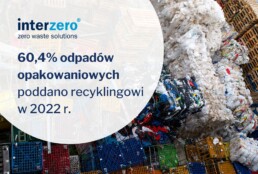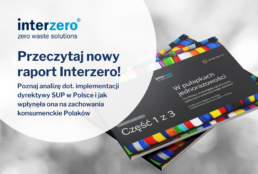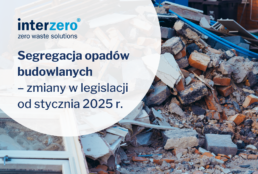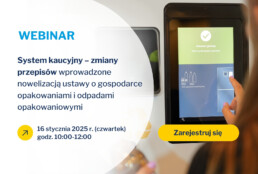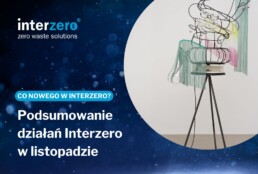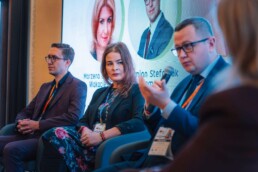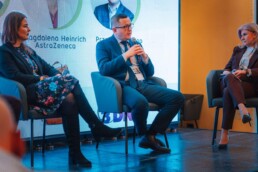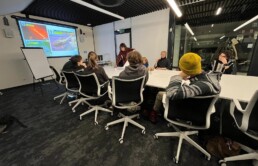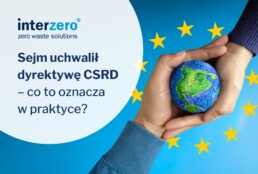Wesołych Świąt Bożego Narodzenia i Szczęśliwego Nowego Roku!
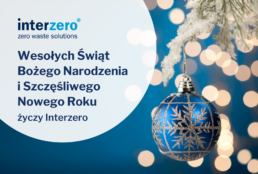
Życzenia świąteczne
Z okazji nadchodzących Świąt Bożego Narodzenia składamy Państwu serdeczne życzenia pomyślności, niepowtarzalnej atmosfery, ciepła oraz obfitości wszelkich dóbr.
Niech radość i pokój Świąt Bożego Narodzenia, a także poczucie prywatnego i zawodowego spełnienia towarzyszą Państwu przez cały Nowy Rok.
Życzy Grupa Interzero w Polsce
24 grudnia biura Interzero czynne do godziny 12:00
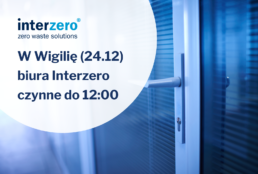
Skrócony dzień pracy w Wigilię
Szanowni Państwo
Uprzejmie informujemy, iż w dniu 24.12.2024 biura Interzero (Warszawa, Łódź, Kraków) będą czynne do godziny 12.00.
W Sylwestra pracujemy w godzinach regularnych.
Zespół Interzero
Independent movers did not meet annual packaging waste recycling targets in 2022.
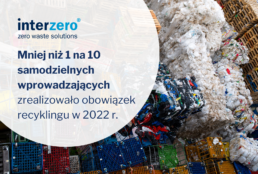
Independent movers did not meet annual packaging waste recycling targets in 2022.
Only 8% of independent introducers achieved the minimum statutory recycling levels in 2022 – according to the IOŚ-PIB report Packaging and packaging waste management in Poland in 2022. In the same period, recovery organizations achieved or even exceeded the annual recycling levels for all types of packaging waste.
Only 8% of independent introducers fulfilled the recycling obligation
Among the introducers who chose to independently ensure the recycling of packaging waste they generated, as many as 11,234 entities were required to achieve the required recycling levels , which in 2022 were:
- 30% for plastic waste,
- 51% for aluminum waste,
- 55% for ferrous metal waste,
- 66% for paper and cardboard waste,
- 62% for glass waste,
- 19% for wood waste,
- 59% for all above types of packaging waste combined.
Based on data from the BDO register, IOŚ-PIB experts calculated that only 8% of independent introducers achieved the minimum levels mentioned . The percentage of independent introducers who managed to meet the statutory minimum is shown in the graph below:
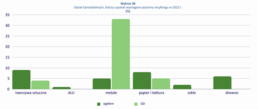
Source: Report on Packaging and Packaging Waste Management in Poland in 2022
At the opposite pole are recovery organizations that in 2022 achieved the statutory recycling levels for packaging waste made of metal, glass, paper and cardboard and exceeded the required recovery level for plastic packaging waste [and] .
Cooperation with a recovery organization is a chance to fulfill the obligation and avoid the product fee
Failure by the entrepreneur to achieve the statutory levels of packaging waste recycling results in the necessity to calculate and pay a product fee, which is a kind of environmental tax. In order to avoid the obligation to pay the fee, the entrepreneur can transfer to the recovery organization its obligation to recycle packaging waste generated from the packaging and products in packaging introduced by it. Thanks to this, the introducer pays only a fixed, low amount under the contract with the recovery organization and does not have to bother with ensuring waste recycling.
Pass on your recycling responsibility to the Interzero Recovery Organisation
Interzero takes over recycling obligations from entrepreneurs in the scope of:
- packaging waste,
- batteries and accumulators,
- post-consumer products: tires, oils and lubricants,
- electrical and electronic equipment.
Thanks to this, every entrepreneur can comprehensively transfer to us all of their obligations resulting from introducing packaging and products to the market. Check what obligations your company is subject to!
By signing one contract you will gain certainty that your company will meet its obligations to ensure statutory levels of recovery, recycling and preparation for reuse.
[1] Packaging and packaging waste management in Poland in 2022, https://ios.edu.pl/wp-content/uploads/2024/09/gospodarka-opakowaniami-i-odpadami-opakowaniowymi-w-polsce-w-2022-r-2.pdf
Where to return food after the holidays? Christmas zero waste solutions
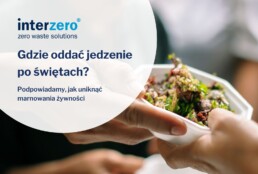
Where to return food after the holidays? Christmas zero waste solutions
Holidays, holidays and after the holidays, and the fridge is still full? Excess food: bought, prepared and then thrown away is almost a permanent element of every celebration and family gathering. Where to give away food after the holidays so that wasting it does not become a new, not very ecological tradition?
How not to waste food? Learn about food sharing
Every year in Poland, around 4.5 million tons of food is wasted, and 60% of that in households. Why? The most common reasons for throwing away food, as declared by respondents, are:
- expiry date – 60%,
- too much shopping – 26%,
- improper storage – 26%,
- purchase of unpalatable products – 25%,
- purchase of poor quality products – 17%,
- too large portions of meals – 18%,
- lack of ideas on how to use the products – 10% [i] .
The amount of food thrown away increases dramatically during the Christmas and New Year period . It is estimated that 83% of people throw away food during this time. December 24 has even been unofficially declared Christmas Food Waste Day – in Poland alone, as much as 9.2 thousand tons of food end up in the bins. [ii]! Can this be remedied?
For environmental reasons, we encourage moderation above all, which is one of the most important ingredients in our recipe for holiday peace . However, we assume that since you have arrived here, you are struggling with the problem of managing food after the holidays and are looking for a solution that is best for you and nature.
The remedy to most of these problems is food sharing . This movement encourages people to give away excess food to people who will gladly accept it and literally save it from going to waste . There is only one condition – the food must still be edible.
Where to drop off food after the holidays? Map of food pantries in Warsaw and throughout Poland
One way to do holiday food sharing is to use canteens, also known as community fridges. Canteens are publicly accessible fridges, cabinets, and sometimes small rooms that allow for the exchange of food . You can not only leave fresh products or dishes there, but also take what others have left on the shelves.
What should be donated to the soup kitchen? Only food that we would eat ourselves. Importantly, it may be past its expiration date – dry and loose products, preserves, spices, and sometimes even properly stored dairy products are often good for consumption after the date indicated on the packaging. However, when giving food to a canteen, it is worth following a few rules :
- products should be placed in clean packaging and tightly closed,
- Homemade dishes should be labeled with their ingredients and preparation date,
- you can leave previously opened products, but you should indicate the date of opening (especially in the case of food that spoils quickly),
- If a dish requires storage at a low temperature, it should definitely be placed in the fridge!
Contrary to appearances, eateries are not the domain of big cities – you can find them in small towns too!
See the nationwide map of canteens
Go to the map of Warsaw’s food places
Don’t see your location here? Try searching for it, for example, in an internet search engine – the network of eateries is constantly growing, so there may be locations in your area that have not yet been marked on the map.
List of places where you can donate food after holidays, events and every day
Food drives are not the only places where you can donate food after the holidays (and not only after the holidays). See where else you can share food!
- Food Banks
These are charitable institutions that accept any type of food and then distribute it to those in need. All food products (including perishable products, such as bread, dairy, meat, fruit and vegetables) can be donated to such a bank at least 2 days before their expiration date. There are 31 such banks in Poland. See the map of Food Banks .
- Facebook groups and local forums
Food sharing is also possible through social media and local groups, which you can find under the names:
- online food hall, foodsharing, freeganism,
- I will give it back, watch out, the garbage truck is coming (or simply: the garbage truck),
- we don’t waste food.
- Caritas Poland Branches
Caritas has long been actively working to help those in need, while also preventing food waste. Local Caritas branches often accept unnecessary food that has been sitting in the fridge, for example after the holidays or an event. It is worth contacting the nearest Caritas branch and donating food to them, which will then be given to those in need.
- Facilities for people in homelessness crisis
Surplus food from the holidays is also readily accepted by shelters and shelters for people in homelessness crisis. A list of all such facilities, divided by province, can be found on the website of the Ministry of Family, Labor and Social Policy .
And when you do have to throw away… How not to waste food that ends up in the trash?
Sometimes food has to be thrown away – it is spoiled, over-salted, burnt, there may be many reasons. However, it is worth doing it wisely. Properly sorted waste from the table, fridge or kitchen cupboard can still be recycled organically, i.e. composted or fermented.
Where to throw away food? Most food goes into the brown bin for bio-waste . This is where unnecessary, spoiled or expired food should go, but with some exceptions. Leftover meat, cold cuts and bones are mixed waste , as are eggs, cheese and other animal products. Mixed dishes containing animal products, such as salads or sauces, are not bio-waste either. Check what we throw away and what we do not throw away into bio-waste .
An alternative to a bio-waste bag is a composter: home, kitchen or electric. It allows you to turn bio-waste into a natural and completely free fertilizer for plants, which can be created in just 24 hours! Such possibilities are provided by the Oklin composter from the Smart line .
[i] Zero recycling point in Poland , https://portalkomunalny.pl/wp-content/uploads/2024/12/raport-punkt-zero-recyklingu-w-polsce.pdf
[ii] Holidays, holidays and… to the trash. We throw away 1.6 kg of holiday food per person , https://www.rp.pl/przemysl-spozywczy/art41538111-swieta-swieta-i-do-kosza-wyrzutmy-1-6-kg-swiateczny-jeczenia-na-osobe
Razem czynimy dobro, czyli Szlachetna Paczka 2024 w Interzero
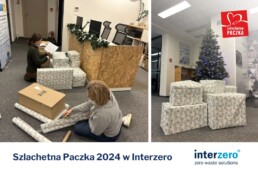
Razem czynimy dobro, czyli Szlachetna Paczka 2024 w Interzero
Po raz kolejny pracownicy Grupy Interzero w Polsce zaangażowali się w projekt Szlachetna Paczka. Dzięki ich datkom udało się zakupić prezenty i potrzebne przedmioty dla rodziny z Krakowa.
Serdecznie dziękujemy koordynatorkom tegorocznej edycji – Alicji Kowalskiej, Edycie Mantorskiej, Joannie Nowak, Anicie Janiec, Klaudii Szymańskiej i Monice Krysztofińskiej – za zorganizowanie zbiórki oraz oraz Jarosławowi Dymkowi, Katarzynie Kacprzak, Aleksandrze Stolarczyk, Aleksandrze Świątek, Paulinie Dulak i Joannie Marek za zapakowanie podarunków. Wielkie podziękowania należą się również wszystkim pracownikom Interzero za wsparcie akcji. Dzięki wam, magia Świąt zawita do kolejnego domu!
Gorąco zachęcamy wszystkich, którym nie udało się w tym roku wziąć udziału w Szlachetnej Paczce, do wsparcia organizacji darowiznami tutaj. Razem możemy sprawić, że Święta będą radosne dla jeszcze większej liczby rodzin!
Dyrektywa SUP, czyli rewolucja na pół gwizdka
Dyrektywa SUP, czyli rewolucja na pół gwizdka
Mimo, że przepisy dyrektywy SUP funkcjonują w Polsce już ponad półtora roku, większość Polaków nie dostrzegła żadnej istotnej zmiany w kwestii opakowań, redukcji plastiku czy dostępności alternatyw dla jednorazówek – wynika z najnowszych danych przedstawionych w pierwszej części raportu „W pułapkach jednorazowości”, zatytułowanej „Klątwa jednorazowego plastiku”, opracowanego przez Interzero.
Rewolucja przeszła i mało kto ją zauważył – tak, w kilku żołnierskich słowach, można byłoby podsumować skutki wejścia w życie tzw. ustawy o jednorazowych plastikach (dalej też: „ustawy SUP” – od Single-Use Plastic). Tylko 13 proc. badanych, zadeklarowało, że wie czym jest dyrektywa SUP, jakie są jej założenia i stawiane przed nią cele, a także – jakimi narzędziami będą one realizowane.
Nie o samą świadomość Polaków jednak chodzi, tylko o niską skuteczność wdrożonych w Polsce mechanizmów, które miały sprzyjać przeciwdziałaniu powstawaniu odpadów i ponownemu użyciu produktów. Jednym z nich jest obowiązujące od 1 stycznia 2024 r. obciążenie opakowań plastikowych dodatkową opłatą, co miało – podobnie jak w przypadku reklamówek, za które od kilku lat płacimy – zachęcić nas do wykorzystania wielorazowych opakowań na napoje i żywność.
Sęk w tym, że 42 proc. badanych nigdy tych dodatkowych opłat nawet nie zauważyło. Z kolei aż 56 proc. je systematycznie ignoruje, bo najczęściej są na tyle niskie względem sumy na paragonie (średnio kilkadziesiąt groszy, najwięcej – ok. 2 zł za sztukę), że nie zachęcają do zrezygnowania z wygody, jaką zdecydowana większość badanych dostrzega w opakowaniach jednorazowych. „Nie trzeba ich myć, oddawać do jakiegokolwiek punktu czy zwracać do restauracji, ani nosić ze sobą na wypadek spontanicznych decyzji o zamówieniu posiłku na wynos” – wskazywali też ankietowani w trakcie pogłębionych badań focusowych przeprowadzonych niezależnie przez Opinia24.
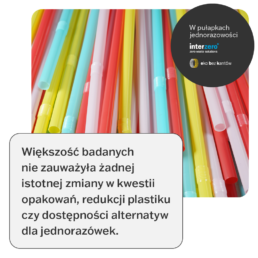
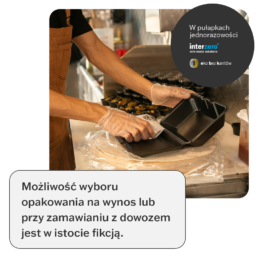
Wielokrotne użycie – wciąż mało zachęt
Niestety, fikcją z perspektywy respondentów jest także oferowanie alternatywnego rodzaju opakowania w placówkach gastronomicznych. Okazuje się, że obowiązek ten realizowany jest bardziej w teorii, niż w praktyce – zdecydowana większość badanych (79 proc.) nigdy nie spotkała się z możliwością wybrania innego, bardziej ekologicznego opakowania w restauracji czy przy zamówieniach na wynos. Tylko jeden na czterech konsumentów kiedykolwiek napotkał informację o prawnie gwarantowanej (właśnie na mocy dyrektywy SUP) alternatywie w postaci opakowania wielorazowego.
Potwierdzali to bezpośrednio sami badani – „Tylko wybór co do sztućców, czy chcesz dodatkowe plastikowe. To jedyny wybór, który mam w aplikacji. Jak przychodzę i zabieram na wynos, to też się mnie nikt nie pyta. Ewentualnie czy dać siatkę, czy wziąć w rękę” – mówił jeden z uczestników badań jakościowych.
– „Zazwyczaj nie ma takiej opcji, to jest po prostu jedna opcja dostępna w danym miejscu. Na przykład „chińczyk” ma swoje pojemniki, pizzeria – kartony na pizzę i nikt nie pyta o to, czy chcemy coś innego. Nie spotkałam się z wyborem” – wtórował drugi.
– „[…] powiem szczerze, że od 1 lipca, zamawiałem wielokrotnie, ponad 15 razy albo i więcej, i nikt ani w lokalu, ani przez telefon nie proponował mi czegoś takiego” – wskazywał kolejny z badanych.
Co mówią o nas wyrzucane opakowania?
W pierwszej części raportu „W pułapkach wielorazowości”, zatytułowanej „Klątwa jednorazowego plastiku” przeczytamy też wiele o nawykach żywieniowych Polaków: co zamawiają najczęściej, gdzie i jak składają zamówienia (przez telefon, aplikacje, osobiście), na co zwracają uwagę, gdy patrzą na oferowane im opakowania, a także, co myślą o opakowaniach wielorazowych.
A to tylko część wniosków z badań jakościowych i ilościowych, które miały pomóc zdiagnozować i opisać stan wdrożenia dyrektywy o jednorazowych plastikach w Polsce. Badania jakościowe objęły wywiady z 24 osobami, badania ilościowe CAWI zostały przeprowadzone na ogólnopolskiej reprezentatywnej próbie 1000 osób. Z całością publikacji możesz zapoznać się tutaj: https://ekobezkantow.pl/raporty/w-pulapkach-jednorazowosci/
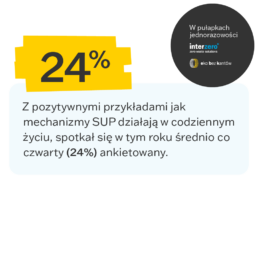
O Eko bez kantów
W „Eko bez kantów” rozmawiamy o ekologii bez naginania prawdy. Rozprawiamy się z mitami, fake newsami i półprawdami. Naszym celem jest wyjaśnienie, dlaczego należy segregować odpady, a nie tylko jak robić to prawidłowo.
„Eko bez kantów” powstało z przekonania, że w świecie pełnym dezinformacji i greenwashingu potrzebne jest wiarygodne źródło rzetelnych informacji. Poruszamy tematy takie jak zrównoważony rozwój, recykling, GOZ i legislacja związane z gospodarką odpadami. Omawiamy wpływ opakowań, baterii i elektrodpadów na środowisko, a także sposoby ich ponownego wykorzystania jako cennych zasobów.
Construction waste segregation – changes from January 2025
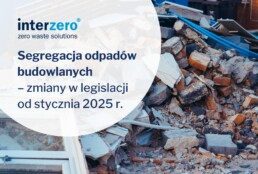
From January, changes in the way construction and demolition waste is segregated
From 2025 segregation of construction and demolition waste at the place of its generation will not be mandatory. The abolition of the obligation to segregate at source (which has not even entered into force yet) is provided for in the draft amendment to the Waste Act, which the Council of Ministers adopted during the session of 29 October 2024.
Abolition of the obligation to separate construction and demolition waste at source
The most important provisions of the amendment are the abolition of the obligation to segregate , i.e. selective collection of construction and demolition waste at the place of its generation, and the definition of responsibility for the segregation of waste fractions.
Every entrepreneur generating construction and demolition waste will be obliged to separate at least 6 fractions at the place of generation:
- wood waste,
- metal waste,
- glass waste,
- plastic waste,
- plaster waste,
- mineral waste, including concrete, bricks, tiles, ceramics and stones.
The draft amendment to the Waste Act was created in response to interpretation doubts and potential problems with the organization and costs of selective collection reported by representatives of the construction industry. The previous version of the regulations, which were to enter into force on January 1, 2025, did not clearly state who is responsible for selective collection and collection of construction and demolition waste. The need to sort them into 6 fractions at the place of generation would also cause a sharp increase in the costs of removing such waste, which in turn could contribute to their illegal storage and disposal directly into the environment .
The waste producer will be able to order segregation
According to the provisions of the act amending the act on waste, an entrepreneur generating construction and demolition waste will be able to transfer it to another authorized entity, which will take over the obligation to separate it into at least 6 fractions outside the place of generation. Importantly, transferring waste to another entity does not completely release the producer of construction and demolition waste from the responsibility for fulfilling the obligation to separate it. If this obligation is not fulfilled due to the fault of the entity that took over the waste, both entities (the producer and the recipient) will be jointly and severally liable for it.
The new regulations are to enter into force on 1 January 2025.
Handling construction and demolition waste according to the hierarchy
In the justification for the draft act, its authors stressed the need for entrepreneurs to comply with the so-called waste management hierarchy:
entities providing services in the field of construction, demolition, renovation of facilities (construction contractors) are obliged to prevent waste generation. [i]
First of all, it is necessary to take action to prevent the generation of construction and demolition waste. Selective waste collection should only take place when the materials are no longer suitable for reuse . The segregation itself is to ensure suitability for preparation for reuse, recycling and other recovery. Regardless of the place of sorting (at the place of generation or outside the place of generation), individual fractions of construction and demolition waste should then be transferred to specialist entities that will take care of their further management. For this purpose, it is often necessary to order professional collection of construction and demolition waste from a specified address offered by, among others, a waste collection company such as Interzero.
[i] https://orka.sejm.gov.pl/Druki10ka.nsf/0/A065E318FFC3BE21C1258BC70041F23F/%24File/766-uzasadzenie.docx
Weź udział w szkoleniu "System kaucyjny - zmiany przepisów wprowadzone nowelizacją ustawy o gospodarce opakowaniami i odpadami opakowaniowymi"
Nowelizacja ustawy o gospodarce opakowaniami i odpadami opakowaniowymi
Ustawa z dnia 13 czerwca 2013 r. o gospodarce opakowaniami i odpadami opakowaniowymi wprowadziła przepisy w zakresie objęcia niektórych opakowań napojów systemem kaucyjnym. Systemy kaucyjne miały być uruchamiane, zgodnie z przepisami tej ustawy, począwszy od stycznia 2025 roku. Jednak dla prawidłowego ich funkcjonowania okazała się niezbędna, zgodnie z postulatami zgłaszanymi m.in. przez przedsiębiorców wprowadzających napoje w opakowaniach, konieczność wprowadzenia do ustawy szeregu dodatkowych zmian.
O czym będziemy mówić podczas szkolenia?
Na szkoleniu zostaną omówione zmiany przepisów ustawy z dnia 13 czerwca 2013 r. o gospodarce opakowaniami i odpadami opakowaniowymi wprowadzone ustawą nowelizującą uchwaloną w grudniu 2024 roku, w tym m.in. przesunięcie uruchomienia systemów kaucyjnych i konsekwencje z tym związane, zmiany w zakresie napojów objętych systemem kaucyjnym, zmiany sposobu pobierania kaucji, objęcie nieodebranej kaucji podatkiem VAT.
Dokładny zakres tematyczny:
- Doprecyzowanie przepisów w zakresie uzyskiwania zezwoleń na tworzenie systemów kaucyjnych.
- Wyłączenie opakowań mleka i produktów mlecznych z systemów kaucyjnych.
- Wprowadzenie obowiązku pobierania kaucji na każdym etapie sprzedaży napojów w opakowaniach.
- Umożliwienie prowadzenia przez sprzedawców tzw. logistyki zwrotnej.
- Obowiązek odbierania opakowań szklanych wielokrotnego użytku przez prowadzących jednostki handlowe o powierzchni nie przekraczającej 200 m2.
- Objęcie podatkiem VAT nieodebranej kaucji.
- Przesunięcie uruchomienia systemów kaucyjnych
Szkolenie poprowadzi: Paweł Sosnowski, Pełnomocnik zarządu ds. regulacji środowiskowych w Interzero
Link do zapisów TUTAJ
Kto powinien wziąć udział?
Webinar jest skierowany przede wszystkim do:
- Przedsiębiorców wprowadzających napoje w opakowaniach
- Specjalistów ds. ochrony środowiska
- Osób odpowiedzialnych za zarządzanie odpadami opakowaniowymi w sieciach handlowych
- Wszystkich zainteresowanych najnowszymi regulacjami prawnymi w zakresie gospodarki opakowaniami
Serdecznie zapraszamy do udziału w webinarze!
Rejestracja na trwa do: 16 stycznia 2025 roku do godziny 8:00.
Co działo się w listopadzie? Przeczytaj podsumowanie ostatniego miesiąca w Interzero
Co działo się w listopadzie? Przeczytaj podsumowanie ostatniego miesiąca w Interzero
Wystąpienia na wydarzeniach branżowych, szkolenia i kampanie oraz warsztaty edukacyjne – chociaż zbliża się koniec roku, a w powietrzu czuć już atmosferę świąt, w Interzero wciąż działamy intensywnie. Serdecznie zapraszamy do zapoznania się z podsumowaniem listopada w Grupie Interzero w Polsce, w którym w skrócie przybliżymy najważniejsze wydarzenia ubiegłego miesiąca.
Environmental Sustainability Dashboard Interzero z międzynarodową certyfikacją GRI Assurance
Environmental Sustainability Dashboard od Interzero jest teraz licencjonowane przez Global Reporting Initiative (GRI)! To dla nas kolejny krok, aby raportowanie ESG stało się proste i dostępne dla każdej firmy. Jednocześnie chcemy, aby nasze narzędzie było niezawodne. Poprzez program GRI Licensing Software & Tools Program, GRI zapewnia, że nasz Environmental Sustainability Dashboard dokładnie i wydajnie uwzględnia standardy GRI, opierając się na najlepszych praktykach. Kluczowe korzyści naszego programu to dokładne raportowanie zrównoważonego rozwoju, pomoc w spełnianiu przepisów prawa i przyciągnięcie interesariuszy – dzięki rzetelnemu i transparentnemu raportowaniu. Jesteśmy niemal pewni, że nawet firmy, które nie będą podlegać raportowaniu ESG, będą musiały prowadzić dokumentację, jeśli będą chciały współpracować z większymi podmiotami.
Biznes a neutralność węglowa – Interzero w debatach zewnętrznych
W tym miesiącu Interzero miało przyjemność być gościem debaty na międzynarodowych targach ITTF Warsaw, czyli na jednym z największych wydarzeń w branży turystycznej, na którym spotykają się partnerzy zaangażowani w rozwój i promocje tego sektora. Nasz reprezentant, Dyrektor Zarządzający w Interzero Przemysław Kuna wziął udział w panelu pt. „Wpływ wyboru dostawców na neutralność węglową podróży służbowych. Jak polityka zrównoważonego rozwoju wpływa na zarządzanie podróżami służbowymi”. Przemysław postulował, aby nie skreślać podmiotów branżowych, które jeszcze nie zainteresowały się ESG. Prelegenci rozmawiali nie tylko o podróżach służbowych, ale też o elektryfikacji floty i o infrastrukturze w Polsce.
Ponadto Przemysław wziął również udział w debacie Rzeczpospolitej: „Jak pogodzić ogień z wodą, czyli potrzeby biznesu i miast wobec ROP w czasie mobilizacji prac nad ustawą”, która odbyła się w redakcji dziennika w ramach cyklu „Walka o klimat”. Nasz ekspert obrał konkretne stanowisko – jako Interzero opowiadamy się za wolnorynkowym i transparentnym modelem rozszerzonej odpowiedzialności producenta. Każdy chce wiedzieć, za co płaci i dlaczego akurat tyle. Nie chcemy, aby przedsiębiorcy stali się jedynie obiektem, na który można nakładać kolejne zobowiązania finansowe. Zachęcamy do zapoznania się z artykułem podsumowującym debatę tutaj.
Szkolenie stacjonarne – kontrola WIOŚ już niestraszna!
Pod koniec listopada Łukasz Pachucki przeprowadził po raz drugi szkolenie stacjonarne w naszej siedzibie w Łodzi, tym razem pod hasłem “Kontrola inspekcji ochrony środowiska w przedsiębiorstwie”. Bardzo cieszymy się, że udało nam się zrealizować ten projekt w bardziej kameralnych grupach. Wymiana wiedzy, doświadczeń i możliwość zadania wszelkich pytań ekspertowi pozwala na dogłębne studium tematu. Przedsiębiorstwa, których pracownicy pojawili się na szkoleniu, znają już każdy krok kontroli, a dzięki sesji Q&A i możliwości konsultacji z naszym ekspertem po szkoleniu mają przygotowane wytyczne i plany, aby oględziny WIOŚ przebiegły bezproblemowo. Dziękujemy prowadzącemu za merytoryczny warsztat oraz wszystkim uczestnikom za zaufanie – mamy nadzieję, że zobaczymy się na kolejnych szkoleniach stacjonarnych!
Na styku kultury i zrównoważonego rozwoju – warsztaty i kampanie
Z inicjatywy Zespołu Edukacji Ekologicznej Interzero, we współpracy z Fundacją Bęc Zmiana, 23 listopada w jednym z warszawskich teatrów odbyły się warsztaty „Architektura odpadów”. Tematem spotkania były między innymi nowe regulacje prawne dotyczące odpadów. Mają one nierozerwalny związek z tworzeniem odpowiedniej przestrzeni miejskiej, mieszkaniowej oraz komunikacyjnej. Uczestnicy i uczestniczki przez pryzmat własnych doświadczeń z wielu branż tworzyli pomysły na nowe rozwiązania, które mogą np.: pomagać konsumentom w aktywnym działaniu w systemie kaucyjnym. Do warsztatu zostali zaproszeni architekci Michał Sikorski i Petro Vladimirov oraz artystka Zofia Strumiłło-Sukiennik. Wybór nie był przypadkowy – każdy z prowadzących w inny sposób mierzy się z tematyką odpadów. Warsztaty były częścią cyklu „Laboratorium badań nad szczęściem. Życie po komfortocenie”, projektu o charakterze artystyczno-badawczym.
29 listopada w krakowskim Muzeum Fotografii odbyła się debata „Spójrz! Czy to działa?”, podczas której skupiliśmy się na temacie kampanii społecznych o odpadach. Była to kontynuacja współpracy Interzero z tą instytucją kultury. Pretekstem do rozmowy były badania Interzero ”Między plusem a minusem” oraz ”Pakujemy się w kłopoty”, które wskazują na mniejsze zaangażowanie młodych dorosłych w kwestie środowiskowe. Wśród prelegentek znalazły się: Alicja Waszkiewicz-Raviv zajmująca się naukowo komunikacją wizualną oraz skutecznością kampanii, Dominika Lenkowska-Piechocka, założycielka agencji Who Will Save The Planet oraz Edyta Mantorska – kierowniczka Zespołu Edukacji Ekologicznej w Interzero. Debatę poprzedził warsztat skierowany do młodzieży.
Miesiąc zakończyliśmy partnerstwem z BWA Wrocław przy projekcie „Wystawa limitowana”. Przy placu Kościuszki 9-10 w stolicy Dolnego Śląska do 16 lutego będzie można zobaczyć siedem rzeźb autorstwa Kasi Fudakowski. Jednym z głównych motywów wystawy jest temat ograniczonych zasobów w kontekście produkcji; do stworzenia wystawy artystkę zainspirowały rozważania o tym, jak „kultura i sztuka są nierozerwalnie związane z zasobami energetycznymi dostępnymi na Ziemi oraz strukturami władzy, która tymi zasobami dysponuje”. Artystka oddała kontrolę nad wystawą publiczności jednocześnie ograniczając energię, która ją zasila. Pytanie zatem, czy każdy z odwiedzających będzie mógł zobaczyć wystawę w tej samej formie. Zespół Edukacji Ekologicznej Interzero przygotował we współpracy z instytucją grudniowy program edukacyjny, który odnosi się w pełni do tematu elektroodpadów.
Ciało, umysł i ekologia - czyli jak naładować baterie z Interzero
W listopadzie zakończyła się trwająca od września w ramach projektu Eko Bez Kantów kampania społeczna „Naładuj swoje baterie” pod patronatem merytorycznym Fundacji Małgosi Braunek Bądź i we współpracy z aplikacją Mindy. W czasie trwania projektu odbył się cykl darmowych webinarów, na których uczestnicy mieli szansę spotkać się online z niezależnymi ekspertami. Rozmawialiśmy między innymi o ekopsychologii, zaletach kąpieli leśnych, praktykach somatycznych rozładowujących stres i zdrowej diecie dla ciała i planety. Ponadto, uczestnicy akcji mogli zdobyć dostęp premium do aplikacji Mindy, publikując w swoich mediach społecznościowych zdjęcia, na których pozbywają się baterii z hasztagiem #naladujswojebaterie.
Listopad był miesiącem obfitującym przede wszystkim w wydarzenia edukacyjne, a także społeczno-kulturalne. Dziękujemy wszystkim pracownikom Interzero zaangażowanym w wymienione działania, a także partnerom za zaproszenie do współpracy – wspólne intersekcjonalne warsztaty i debaty to coś, co zawsze zbliża i daje więcej możliwości na rozwój i szersze edukowanie społeczeństwa o istocie zrównoważonego rozwoju.
Adoption of ESG reporting – see details
On November 21, the Sejm adopted an amendment to the act on reporting obligations in the field of sustainable development. The obligation to submit an ESG report for 2024 will cover over 3,000 companies in Poland. Already in 2026, regulations will cover small and medium-sized enterprises listed on regulated markets. Is Polish business ready for this?
What do the new regulations mean for Polish businesses?
The introduction of mandatory ESG reporting in Poland will have a significant impact on companies that meet the criteria set out in the EU CSRD directive. As in other European Union countries, these companies will be required to prepare annual sustainability reports . These reports will have to meet legal requirements and standards included in the EU regulation. ESG documentation will be formally equal to financial reports, and its content will have to be approved by independent auditors. Failure to comply with the obligation to prepare a report may involve serious consequences, including criminal liability.
What about companies that will not be subject to reporting obligations?
Companies that will not be directly subject to the ESG reporting obligation will also feel the effects of the adoption of the EU regulation. Why? We suspect that many of them will have to collect and analyze data on environmental impact anyway. These will probably be necessary documents for contractors or companies belonging to the same capital group, which will be subject to the reporting requirement. It is possible that partners will be required to support in providing appropriate data. That is why we encourage representatives of small and medium-sized enterprises to take an interest in the topic of ESG now. If they do not implement an appropriate operational strategy, the business may suffer seriously in a few years. Customers are also more willing to turn to products and services of transparent suppliers.
A Practical Guide to ESG for Every Business
The Interzero team, knowing that both small and larger companies will need expert help to implement ESG, has prepared an e-book for you. This is a document that contains all the necessary information. It is written in simple, accessible language. In it, we explain what the CSRD directive is, introduce a reporting schedule, show how to communicate on the topic of sustainable development, and present the operational steps that should be taken to prepare your business for ESG. Fill out the form on our website and you will get completely free access to it. Your education is one of the most important factors in the development of the company you run.
Summary and schedule
The news about the adoption of reporting is just the tip of the iceberg. We know how much the Polish business model will change now and we want our clients to be prepared for it. As a company, we believe in technology and innovation. That is why we want to guide all interested parties through the ESG topic smoothly and calmly. We remind you that reporting will be mandatory:
- from 2025 – for large enterprises (over 250 employees and/or EUR 50 million in turnover and/or EUR 25 million in total assets),
- from 2026 – for SMEs listed on the stock exchange.
Environmental Sustainability Dashboard – a tool for non-financial ESG reporting – our proprietary consulting solution. The tool will streamline data collection and monitoring processes – thanks to which you can precisely track ESG indicators. This is a solution for companies that want to be ready for mandatory reporting. Customers get access to an online platform and full advice on assessing the impact on the environment.
